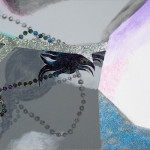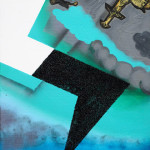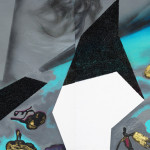Transcending the Limits
Amor Fati? Before surrendering/sacrificing oneself to the world, there comes reflection. As a “nod to the game of creation” and intoxicated with delight and beauty, Nietzsche dreams of unconditional love to the necessary, yet he never pronounces amen over anything. Art has the capacity to connect both. Art transcends limits by promoting the “infinite”. However, art may give its unconditional nod only to the absolute.
Veronika Drahotova’s oevre develops this differentiating nod to life. It is full of codes which make ironic references to one another. It is full of dialectic raptures: sensuous/spiritual, demeaning/reflecting, harmonious/disharmonious. Her ironic sentimentality manipulates our feelings. In her work, seemingly pop art references question alienating commerce and female nudity confronts society’s sexism. Subjects of her paintings are encoded in their titles and things become indistinguishable.
Amor Fati? Yes, but one that does not trick itself.
Peter Noever
Fate” or “love of one’s fate”. It is used to describe an attitude in which one sees everything that happens in one’s life, including suffering and loss, as good. That is, one feels that everything that happens is destiny’s way of reaching its ultimate purpose, and so should be considered good. Moreover, it is characterized by an acceptance of the events or situations that occur in one’s life. It is almost identical to the Jewish concept of Gam Zu Letovah (this too is for the best).
The phrase is used repeatedly in Nietzsche’s writings and is representative of the general outlook on life he articulates in section 276 of The Gay Science, which reads,
I want to learn more and more to see as beautiful what is necessary in things; then I shall be one of those who make things beautiful. Amor fati: let that be my love henceforth! I do not want to wage war against what is ugly. I do not want to accuse; I do not even want to accuse those who accuse. Looking away shall be my only negation. And all in all and on the whole: some day I wish to be only a Yes-sayer.










